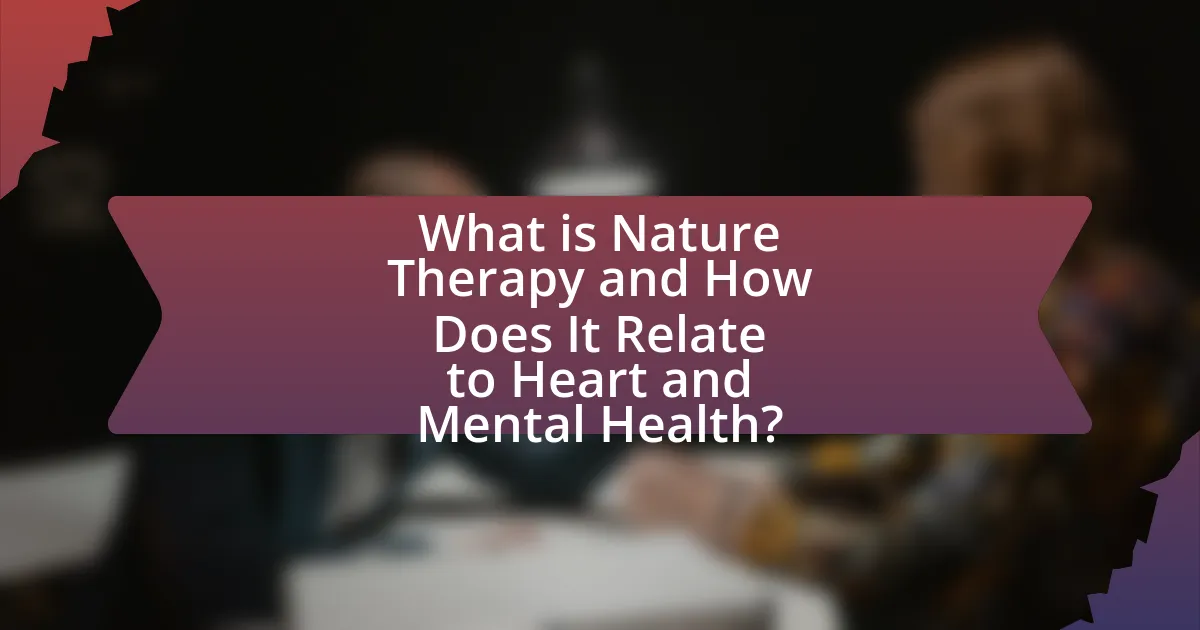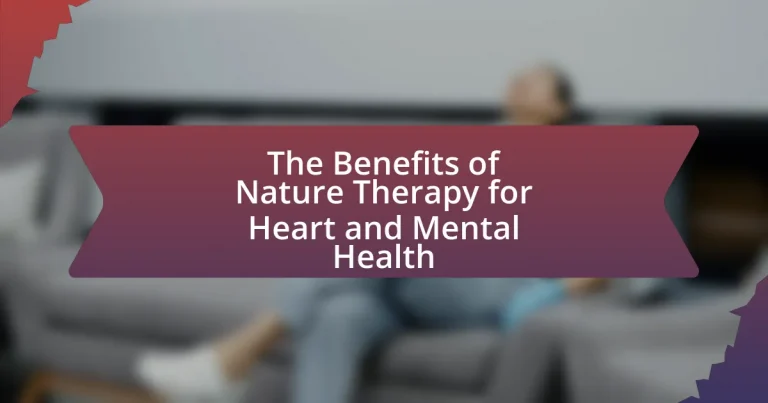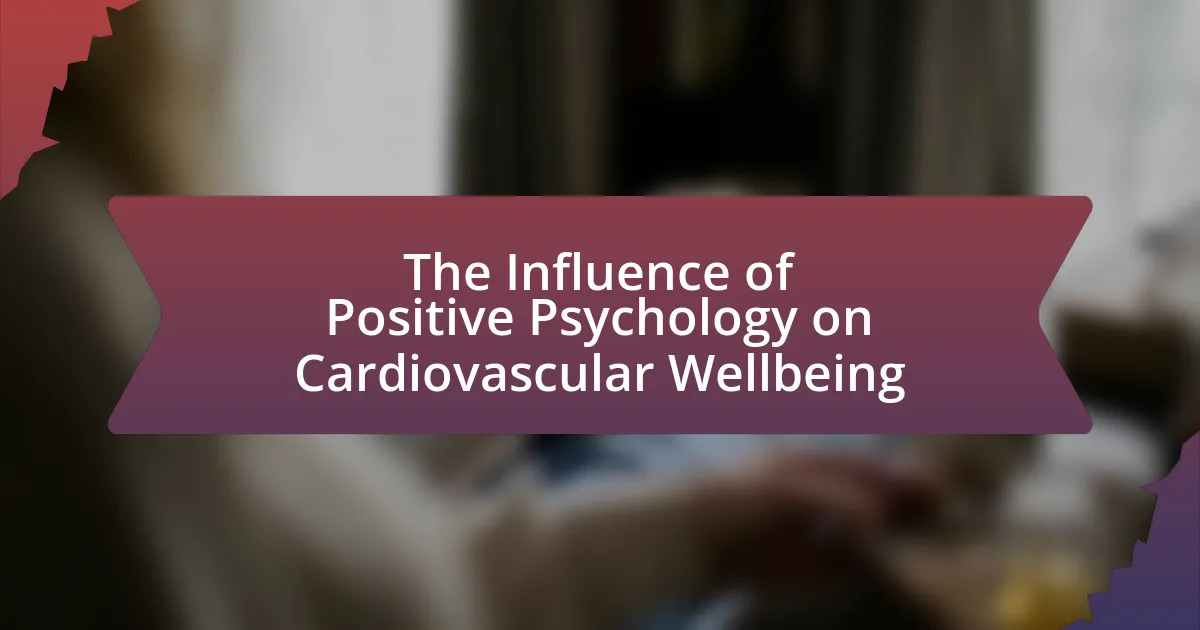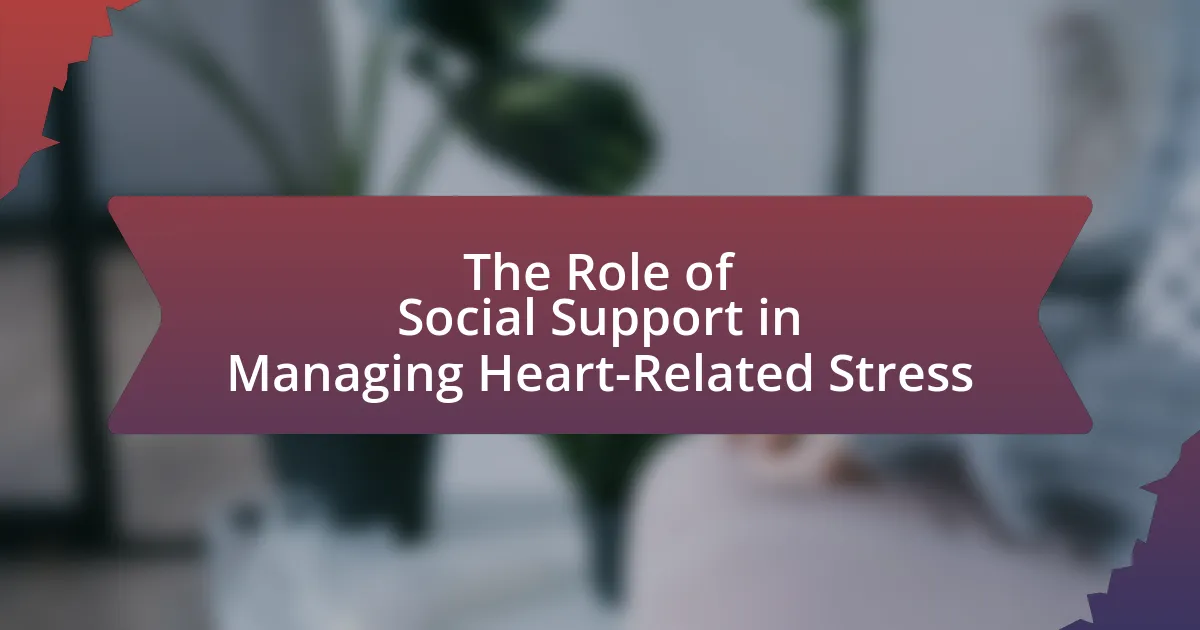Nature therapy, also known as ecotherapy, is a therapeutic practice that utilizes engagement with natural environments to enhance mental and physical well-being. Research indicates that nature therapy can significantly lower blood pressure, reduce stress, and improve mood, thereby benefiting both heart health and mental health. Key principles include immersion in nature, mindfulness, and physical activity, which collectively contribute to reduced symptoms of anxiety and depression. The article explores the physiological and psychological benefits of nature therapy, its effectiveness compared to traditional therapy, and practical tips for incorporating nature therapy into daily life, highlighting its relevance for various populations, including those with mental health disorders and heart disease.

What is Nature Therapy and How Does It Relate to Heart and Mental Health?
Nature therapy, also known as ecotherapy, involves engaging with nature to improve mental and physical well-being. Research indicates that spending time in natural environments can lower blood pressure, reduce stress, and enhance mood, which directly benefits heart health and mental health. For instance, a study published in the Journal of Environmental Psychology found that individuals who participated in nature-based activities reported significant reductions in anxiety and depression levels, highlighting the therapeutic effects of nature on mental health. Additionally, the American Heart Association emphasizes that stress reduction through nature exposure can lead to improved cardiovascular health, demonstrating a clear link between nature therapy and both heart and mental health outcomes.
How is Nature Therapy Defined?
Nature therapy is defined as a therapeutic practice that involves engaging with nature to promote mental and physical well-being. This approach leverages natural environments to reduce stress, enhance mood, and improve overall health outcomes. Research indicates that exposure to nature can lower cortisol levels, decrease anxiety, and improve cardiovascular health, supporting the effectiveness of nature therapy in addressing both mental and heart health issues.
What are the key principles of Nature Therapy?
The key principles of Nature Therapy include immersion in natural environments, mindfulness, and the promotion of physical and mental well-being. Immersion in natural settings has been shown to reduce stress and anxiety, as evidenced by studies indicating that spending time in nature lowers cortisol levels. Mindfulness practices, often integrated into Nature Therapy, enhance emotional regulation and foster a sense of connection to the environment. Additionally, engaging in physical activities outdoors, such as walking or gardening, contributes to cardiovascular health and overall mental wellness, supported by research highlighting the positive effects of nature on heart health and psychological resilience.
How does Nature Therapy differ from traditional therapy?
Nature Therapy differs from traditional therapy primarily in its focus on the natural environment as a therapeutic agent. While traditional therapy often takes place in clinical settings and emphasizes verbal communication and cognitive techniques, Nature Therapy incorporates outdoor experiences and interactions with nature to promote mental and emotional well-being. Research indicates that exposure to natural environments can reduce stress, anxiety, and depression, enhancing overall mental health, as evidenced by studies showing that spending time in nature can lower cortisol levels and improve mood.
Why is Nature Important for Human Health?
Nature is important for human health because it provides essential benefits that enhance physical and mental well-being. Exposure to natural environments has been shown to reduce stress, lower blood pressure, and improve mood, which are critical factors for heart health and mental wellness. Research indicates that spending time in nature can decrease cortisol levels, a hormone associated with stress, and promote feelings of relaxation and happiness. For instance, a study published in the journal Environmental Science & Technology found that individuals who engaged in nature walks reported significant reductions in anxiety and depression symptoms. Thus, the connection between nature and health is supported by evidence demonstrating its positive impact on both heart and mental health.
What are the psychological benefits of being in nature?
Being in nature significantly enhances psychological well-being by reducing stress, anxiety, and depression. Research indicates that exposure to natural environments can lower cortisol levels, which are associated with stress, and improve mood. A study published in the journal “Environmental Science & Technology” found that individuals who spent time in green spaces reported lower levels of mental distress and higher levels of happiness. Additionally, nature exposure has been linked to improved attention and cognitive function, as demonstrated in research by Berman et al. (2012), which showed that a walk in nature can enhance creative problem-solving abilities. These findings underscore the profound impact that nature has on mental health, making it a vital component of therapeutic practices.
How does nature exposure impact physical health, particularly heart health?
Nature exposure significantly improves physical health, particularly heart health, by reducing stress and lowering blood pressure. Studies indicate that spending time in natural environments can decrease cortisol levels, which are linked to stress, and promote relaxation, leading to improved cardiovascular function. For instance, research published in the journal Environmental Health Perspectives found that individuals who regularly engage with nature exhibit lower rates of heart disease and hypertension compared to those with limited exposure. Additionally, a study by the University of East Anglia revealed that spending at least two hours a week in green spaces is associated with better overall health outcomes, including heart health.
What Evidence Supports the Benefits of Nature Therapy?
Nature therapy has been shown to provide significant benefits for both heart and mental health, supported by various studies. Research published in the journal “Environmental Health Perspectives” indicates that spending time in natural environments can lower blood pressure, reduce stress hormones, and improve overall cardiovascular health. Additionally, a meta-analysis in “Health & Place” found that exposure to green spaces is associated with reduced symptoms of anxiety and depression, highlighting the psychological benefits of nature therapy. These findings collectively demonstrate that nature therapy can enhance both physical and mental well-being.
What studies have been conducted on Nature Therapy and mental health?
Numerous studies have been conducted on Nature Therapy and its effects on mental health, demonstrating significant benefits. For instance, a study published in the journal “Environmental Science & Technology” by Bratman et al. (2015) found that participants who walked in natural environments reported lower levels of rumination and improved mood compared to those who walked in urban settings. Another research conducted by Kaplan and Kaplan (1989) highlighted that exposure to natural environments can reduce stress and enhance psychological well-being. Additionally, a meta-analysis by Bowler et al. (2010) indicated that nature exposure is associated with reductions in anxiety and depression symptoms. These studies collectively support the premise that Nature Therapy can positively influence mental health outcomes.
How does Nature Therapy influence cardiovascular health?
Nature Therapy positively influences cardiovascular health by reducing stress and lowering blood pressure. Engaging with natural environments has been shown to decrease levels of cortisol, a stress hormone, which in turn can lead to improved heart function. A study published in the Journal of Environmental Psychology found that individuals who spent time in nature exhibited lower heart rates and improved cardiovascular responses compared to those in urban settings. This evidence supports the notion that Nature Therapy can enhance cardiovascular health through its stress-reducing effects.

How Does Nature Therapy Improve Mental Health?
Nature therapy improves mental health by reducing stress, anxiety, and depression through exposure to natural environments. Studies indicate that spending time in nature can lower cortisol levels, which are associated with stress, and enhance mood by increasing feelings of well-being. For instance, research published in the journal “Environmental Science & Technology” found that individuals who engaged in nature walks reported a 20% decrease in rumination, a key factor in mental health issues. Additionally, nature therapy promotes mindfulness and encourages physical activity, both of which contribute positively to mental health outcomes.
What specific mental health conditions can Nature Therapy address?
Nature Therapy can address specific mental health conditions such as anxiety, depression, stress, and attention deficit hyperactivity disorder (ADHD). Research indicates that exposure to natural environments can significantly reduce symptoms of anxiety and depression, as evidenced by a study published in the Journal of Environmental Psychology, which found that individuals who engaged in nature-based activities reported lower levels of stress and improved mood. Additionally, Nature Therapy has been shown to enhance focus and attention, particularly in individuals with ADHD, by providing a calming and restorative environment that fosters mental clarity.
How does Nature Therapy help with anxiety and depression?
Nature Therapy helps with anxiety and depression by promoting relaxation and reducing stress through exposure to natural environments. Studies indicate that spending time in nature can lower cortisol levels, which are associated with stress, and enhance mood by increasing feelings of well-being. For instance, research published in the Journal of Environmental Psychology found that individuals who engaged in nature-based activities reported significant reductions in anxiety and depressive symptoms. Additionally, the presence of greenery and natural light has been shown to improve cognitive function and emotional resilience, further supporting mental health.
What role does Nature Therapy play in stress reduction?
Nature Therapy significantly reduces stress by promoting relaxation and enhancing mood through exposure to natural environments. Research indicates that spending time in nature lowers cortisol levels, which are associated with stress, and improves overall mental well-being. A study published in the journal Environmental Science & Technology found that individuals who engaged in nature-based activities reported a 20% reduction in stress levels compared to those who did not. Additionally, nature therapy encourages mindfulness and physical activity, both of which contribute to decreased anxiety and improved emotional health.
How Can Nature Therapy Be Practiced Effectively?
Nature therapy can be practiced effectively by engaging in regular outdoor activities that promote mindfulness and connection with the natural environment. Activities such as hiking, gardening, or simply walking in a park can enhance mental well-being and cardiovascular health. Research indicates that spending time in nature reduces stress, lowers blood pressure, and improves mood, as evidenced by a study published in the journal Environmental Health and Preventive Medicine, which found that participants who engaged in nature walks reported significant reductions in anxiety and depression levels. Additionally, incorporating elements like deep breathing exercises or meditation while in nature can further amplify these benefits, fostering a holistic approach to mental and heart health.
What are some common activities involved in Nature Therapy?
Common activities involved in Nature Therapy include hiking, gardening, forest bathing, and mindfulness meditation in natural settings. Hiking allows individuals to engage with their environment physically and mentally, promoting cardiovascular health and reducing stress. Gardening fosters a connection to nature while providing therapeutic benefits through physical activity and sensory engagement. Forest bathing, or Shinrin-yoku, encourages immersion in a forest atmosphere, which has been shown to lower cortisol levels and enhance mood. Mindfulness meditation in natural settings helps individuals focus on the present moment, reducing anxiety and improving overall mental well-being. These activities collectively contribute to the therapeutic effects of nature on heart and mental health.
How can individuals incorporate Nature Therapy into their daily lives?
Individuals can incorporate Nature Therapy into their daily lives by engaging in outdoor activities such as walking, gardening, or simply spending time in green spaces. Research indicates that spending at least 20 minutes in nature can significantly reduce stress and improve mood, as shown in a study published in the Journal of Environmental Psychology, which found that nature exposure leads to lower levels of cortisol, a stress hormone. Additionally, practicing mindfulness in natural settings, such as focusing on the sounds of birds or the feel of grass, enhances mental well-being and fosters a deeper connection with the environment.

What Are the Cardiovascular Benefits of Nature Therapy?
Nature therapy provides significant cardiovascular benefits, including reduced blood pressure, improved heart rate variability, and lower levels of stress hormones. Studies indicate that spending time in natural environments can lead to a decrease in systolic and diastolic blood pressure, which is crucial for heart health. For instance, research published in the Journal of Environmental Psychology found that individuals who engaged in nature therapy experienced a 10% reduction in blood pressure after just a short exposure to green spaces. Additionally, nature therapy has been linked to enhanced heart rate variability, a marker of cardiovascular resilience, as shown in a study by the University of Utah, which reported improved autonomic function among participants who spent time in nature. Furthermore, exposure to natural settings has been associated with lower cortisol levels, contributing to reduced stress and anxiety, which are known risk factors for cardiovascular diseases.
How does Nature Therapy contribute to heart health?
Nature Therapy contributes to heart health by reducing stress and lowering blood pressure. Engaging with natural environments has been shown to decrease cortisol levels, which are linked to stress, and promote relaxation. A study published in the Journal of Environmental Psychology found that spending time in nature can lead to significant reductions in heart rate and blood pressure, indicating improved cardiovascular health. Additionally, exposure to green spaces encourages physical activity, which is essential for maintaining a healthy heart.
What physiological changes occur in the body during Nature Therapy?
Nature Therapy induces several physiological changes in the body, including reduced cortisol levels, lower blood pressure, and improved heart rate variability. These changes occur as the body responds to the calming effects of natural environments, which can lead to decreased stress and anxiety. Research indicates that spending time in nature can lower cortisol, a stress hormone, by up to 15% (source: “The Influence of Nature on Health: A Review of the Evidence,” authors: Bratman et al., 2015). Additionally, exposure to natural settings has been linked to improved cardiovascular health, as evidenced by studies showing a significant reduction in systolic and diastolic blood pressure after nature exposure (source: “Nature Exposure and Health: A Review,” authors: Frumkin et al., 2017). These physiological changes contribute to enhanced mental well-being and overall heart health.
How does Nature Therapy affect blood pressure and heart rate?
Nature Therapy significantly lowers blood pressure and heart rate. Studies indicate that spending time in natural environments can lead to reductions in systolic and diastolic blood pressure, as well as heart rate variability. For instance, research published in the Journal of Environmental Psychology found that participants who engaged in nature walks experienced a decrease in both blood pressure and heart rate compared to those who walked in urban settings. This effect is attributed to the calming influence of nature, which reduces stress and promotes relaxation, thereby positively impacting cardiovascular health.
What Populations Can Benefit Most from Nature Therapy?
Individuals with mental health disorders, such as anxiety and depression, as well as those with chronic illnesses, can benefit most from nature therapy. Research indicates that exposure to natural environments can significantly reduce symptoms of stress and improve overall mental well-being. For instance, a study published in the Journal of Environmental Psychology found that individuals who engaged in nature-based activities reported lower levels of anxiety and improved mood. Additionally, populations such as veterans, children with behavioral issues, and the elderly have shown positive responses to nature therapy, highlighting its broad applicability across various demographics.
How can Nature Therapy be beneficial for different age groups?
Nature Therapy can be beneficial for different age groups by promoting mental well-being, reducing stress, and enhancing physical health. For children, exposure to nature fosters creativity, improves attention spans, and encourages physical activity, which is crucial for their development. Adolescents benefit from nature therapy by experiencing reduced anxiety and improved mood, as studies show that green spaces can lower cortisol levels. Adults find that nature therapy helps alleviate symptoms of depression and anxiety, with research indicating that spending time outdoors can enhance overall life satisfaction. For seniors, nature therapy can improve cognitive function and reduce feelings of isolation, as engaging with natural environments has been linked to better mental health outcomes. Overall, the diverse benefits of nature therapy across age groups are supported by various studies highlighting its positive impact on mental and physical health.
What specific groups (e.g., patients with heart disease) can gain the most from Nature Therapy?
Patients with heart disease, individuals with anxiety and depression, and those recovering from surgery can gain the most from Nature Therapy. Research indicates that exposure to natural environments can lower blood pressure, reduce stress, and improve overall mental well-being. A study published in the Journal of Environmental Psychology found that spending time in nature significantly decreased levels of cortisol, a stress hormone, which is particularly beneficial for heart disease patients. Additionally, a meta-analysis in the International Journal of Environmental Research and Public Health highlighted that nature therapy can enhance mood and reduce symptoms of anxiety and depression, making it effective for individuals facing mental health challenges.
What Practical Tips Can Enhance the Experience of Nature Therapy?
Engaging in nature therapy can be enhanced by incorporating specific practical tips. First, choose a natural setting that resonates with you, such as a forest, park, or beach, as studies indicate that exposure to diverse natural environments can significantly reduce stress and improve mood. Second, practice mindfulness during your time in nature by focusing on your surroundings, which has been shown to enhance emotional well-being and foster a deeper connection to the environment. Third, incorporate physical activity, such as walking or hiking, as research demonstrates that exercise in natural settings can lead to improved cardiovascular health and mental clarity. Lastly, limit digital distractions by leaving devices behind, as this allows for a more immersive experience, promoting relaxation and mental rejuvenation. These tips are supported by various studies highlighting the positive effects of nature on mental and heart health, reinforcing the benefits of nature therapy.
How can individuals maximize the benefits of Nature Therapy?
Individuals can maximize the benefits of Nature Therapy by engaging in regular outdoor activities that promote mindfulness and physical movement. Research indicates that spending time in natural environments can reduce stress, lower blood pressure, and improve mood, which are crucial for heart and mental health. For instance, a study published in the journal Environmental Science & Technology found that participants who walked in nature reported lower levels of rumination and improved emotional well-being compared to those who walked in urban settings. Additionally, incorporating practices such as meditation or yoga in natural surroundings can enhance the therapeutic effects, as these activities foster a deeper connection with the environment and promote relaxation.
What are some common challenges faced in practicing Nature Therapy?
Common challenges faced in practicing Nature Therapy include accessibility to natural environments, varying individual responses to nature, and the need for trained facilitators. Accessibility can be limited by urbanization, physical disabilities, or lack of transportation, making it difficult for some individuals to engage with nature. Additionally, not everyone experiences the same therapeutic benefits from nature; personal preferences and psychological factors can influence the effectiveness of Nature Therapy. Finally, the requirement for trained facilitators to guide sessions can pose a challenge, as there may be a shortage of qualified professionals in certain areas, impacting the quality and availability of Nature Therapy programs.





